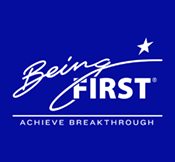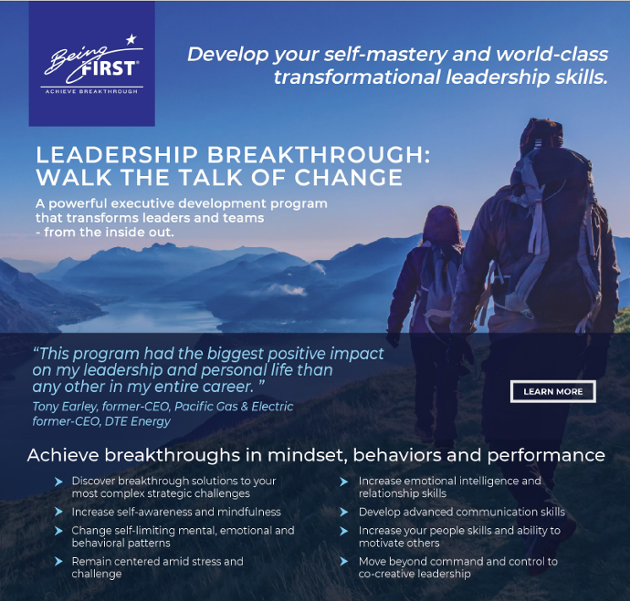Great transformational leaders have many skills, traits and characteristics in common:
- They see the big picture and the relationships between market, organizational, human, and cultural dynamics.
- They see interdependencies, cause-and-effect relationships, delayed consequences, and distant impacts of local actions that others miss.
- They navigate complexity well. They can see the roadmap for solving complex challenges that create new possibilities.
- They relate and connect to people in authentic ways.
- They engage others, communicate and listen deeply, and ignite the passions and motivations of those around them.
Our organizations, and the world, need great transformational leaders. How do we develop them and advance their transformational leadership skills? It all starts with self-mastery.
What is Self-Mastery?
Self-mastery is self-development from the inside out. It starts with turning inward, introspecting, and building awareness of one's interior. It entails discovering one's behavior patterns, good and bad, and un-packing what causes them. This reveals our deeper emotional patterns and the underlying beliefs and mindsets that trigger them. Going deeper within, self-mastery leads to the discovery of the fundamental assumptions that we hold about life, people, and ourselves.
Transformation: Becoming Your “Best Self”
On a foundation of self-awareness and understanding, new capabilities can emerge if we continue our self-mastery journey and learn how to change our mental, emotional, and behavioral patterns. First, we can assess which support success and which don’t. Then, with personal change, new ways of being, relating, and performing become available to us. We can grow into the person we choose to be. We can become our best self over time. And this “best self” becomes the foundation of a great transformational leadership approach.
The Ego and the “Shadow Self”
Most people don't have a high level of self-understanding, nor the ability to change and grow. As they enter adulthood, they have certain perspectives, emotional patterns, and ways of being, and over time, they become more set in those ways. Most people do not introspect, and may even lack interest in developing self-awareness. Consequently, they are not able to change and grow in any expedient way.
We all have egos. Our egos become conditioned to respond to circumstances in specific ways. Throughout our early lives, this conditioning occurs based on our experiences, our reactions to them, and how we process those reactions within ourselves. This conditioning establishes our beliefs and our emotional and behavioral patterns. We establish values and judgments about what is right and wrong, good and bad; beliefs about what we should and shouldn't do, which we carry into our adult lives.
Our egos develop fears and anxieties, and these doubts become the foundation of what psychologists call our "shadow." When our fears are triggered in any circumstance, our worldview and mindset get myopic. Our perspective shrinks. We tell more and listen less. We direct others rather than get their input. We fall into believing we know the answer rather than inquiring about other ways or possibilities. Our leadership style gets steeped in command-and-control. This human dynamic occurs often in leading business transformation because there is such uncertainty and complexity involved. Often, we don’t know the answer, direction, or next step. Confusion and chaos can be high, triggering our inner doubts and fears. The command-and-control style that often results is exactly the opposite of what is needed in leading transformation.
Co-Creative Leadership
Transformation requires a co-creative leadership style where we engage others, communicate openly, and listen deeply. We dialogue together about our future and our vision for it. We don’t command-and-control others to this vision. Rather, we work together, with a “quality of equality” between leaders, their teams, and the workforce. That does not mean that everyone is equal in insight, skill, power position, or ability to contribute. Certainly, there will be differentials in skill and contribution level, but fundamentally, the leaders and the workforce work together as equal humans all contributing their full capabilities and passions to achieving their common vision. In co-creating, everyone is fully invested and engaged.
Leaders who operate co-creatively may still make the decisions or provide ultimate direction, but how they do this is key. With a co-creative mindset, transformational leaders create relationship. They provide the space and opportunities for others to be fully engaged in ways that command-and-control can never produce. Greater collective wisdom gets expressed. There is more openness and learning, more discovery and ability to navigate the complexities of achieving breakthrough. The leadership mindset and behavior of co-creating unleashes the potential of the organization.
Self-Mastery in Action
Leaders with greater self-mastery display co-creative leadership traits and behaviors, as this way of being becomes natural as we transform our ego’s fears. Leading transformation with these skills enables us to connect more, engage others more, and seek and listen to their perspectives. As we do the inner work of overcoming our ego’s fears, our minds open to new ideas and possibilities. We have clearer vision about what is possible for the future, and we know in our hearts that our chance of creating that future lies in co-creating with others, not commanding them to it. The personal transformation of our interior that has occurred during our self-mastery journey, by extension, generates deeper care and concern for others. It becomes easier for us to work with others across boundaries of hierarchy, race, gender, political affiliations, and world-views to co-create a future that works for all. With more people in the boat, aligned and contributing their share, achieving breakthrough and transformation become more certain.
Self-mastery is the foundation of great transformational leadership. Pursue self-mastery in yourself and promote these transformational leadership skills in others. Your people and organizations will thrive, and the world will become a better place.




